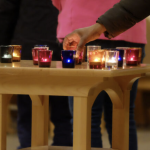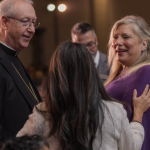Quebec’s Catholic bishops issued a sharp response to Premier François Legault’s suggestion to ban prayer in public spaces, warning that such a move would erode fundamental freedoms and remove people and communities of faith from Quebec’s public space, as recently
Legault made the proposal at a press conference on Friday, suggesting his government might use the notwithstanding clause to shield such a ban from constitutional challenges.
His comments sparked criticism from religious leaders and federal politicians alike.
In an open letter released on Tuesday, Bishop Martin Laliberté, president of the Assembly of Catholic Bishops of Quebec, said prohibiting public prayer would be both impractical and discriminatory. The bishops expressed concern that such measures disproportionately target minority religious groups while ignoring the diversity that has historically enriched Quebec’s identity.
The bishops said public spaces already accommodate a wide variety of activities, many of which temporarily limit access, such as sports and questioned why spiritual or religious practices should be treated differently.
They also pointed to the broader societal impact, noting that religious groups organize public events not only for prayer but for charitable purposes. They asked whether prayer would be suppressed during such gatherings.
“Prayer is not dangerous,” the bishops wrote, emphasizing that fears about public prayer often stem from misconceptions about minority faith communities. They stressed the importance of dialogue and mutual understanding, echoing Pope Francis’s calls for interreligious engagement.
The letter also said Quebec’s secularism laws should not require a secular society. Citing the Universal Declaration of Human Rights and the charters of rights in both Quebec and Canada, the bishops reminded Premier Legault that freedom of religion includes the right to practise one’s beliefs publicly.
Legault’s proposal comes amid heightened discussions about secularism in Quebec, with the government already planning legislation to strengthen secular practices in schools following reports of Muslim prayer being permitted in public schools.
Images of Muslims praying in Montreal streets have created controversy in recent months, but the bishops said public prayer is not limited to one faith. Catholic traditions, such as the Way of the Cross procession in Montreal on Good Friday, regularly take place in public spaces.
Federal Immigration Minister Marc Miller criticized Legault’s remarks, and asked whether he would ban Christians from climbing the stairs of St. Joseph’s Oratory on their knees.
Daniel Baril, president of the Mouvement laïque québécois, said Legault’s proposal caught many by surprise. While his group supports secularism, Baril said there is no objection to public religious events like the Good Friday procession, which require permits. He expressed concerns about “spontaneous” gatherings, such as a recent celebration of Eid al-Adha in a Montreal park.
Laliberté noted that people practise yoga and tai chi in parks and asked whether their spiritual roots would be considered religious practice.
“It’s a slippery slope toward the disrespect of the fundamental rights of individuals,” he said.
Your voice matters! Join the conversation by submitting a Letter to the Editor here.



